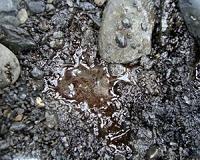 |
New Orleans, Louisiana (AFP) May 27, 2010 BP's risky bid to plug a Gulf of Mexico well appeared to be working Thursday, but new data showed it was already the worst oil spill in US history with a huge slick fouling the seas. US officials said that, for the first time since an April 20 explosion ripped through a BP-leased rig, the oil leak seemed to have stopped, but the glimmer of good news is too late to avert an environmental catastrophe. Even if the BP's "top kill" maneuver succeeds in capping the leak, millions of gallons of crude are sloshing about in the Gulf waters, and a visibly angered President Barack Obama moved to rein in the oil industry. He barred any new deepwater oil exploration for six months and suspended some permits and lease sales off the vulnerable coasts of Alaska and Virginia. The president also lashed out at BP suggesting it may have sought to downplay the true extent of the economic and ecological disaster now threatening the southern states of Louisiana, Alabama and Mississippi as well as Florida. New data released by government scientists said the oil may have been flowing at a rate up to four times higher than previously estimated by BP. The new estimates suggested the oil was gushing out at a rate of between 12,000 to 19,000 barrels a day -- much higher than the previous estimate of 5,000 barrels a day. Under such a scenario, that would mean between 18.6 million gallons and 29.5 million gallons of oil have seeped into the Gulf -- way higher than the 11 million gallons of crude spilled in the 1989 Exxon Valdez disaster off Alaska. With 100 miles (160 kilometers) of Louisiana coastline already contaminated, there are fears US officials may order the burning of the state's unique marshlands, home to a variety of endangered birds and mammals. "If they do that they've killed everything," Margaret Curole, a spokeswoman for a commercial fishermen's association, bursting into tears. "It's everything we love disappearing." BP and the government have been heavily criticized for failing to get the spill under control. Obama dismissed charges the government response had been too slow. But he said it was legitimate to question whether the British energy giant was "being fully forthcoming about the extent of the damage." Coast Guard chief Thad Allen, who is coordinating the US government's battle against spill, said the "top kill" maneuver launched on Wednesday by BP to plug the leak had stopped the gush of oil from the mile-deep well. But he cautioned it was still too early to declare victory as BP pumps heavy drilling liquids, dubbed mud, into the fractured wellhead to beat back the flow of oil, before sealing it with concrete. "They've been able to stabilize the wellhead, they're pumping mud down it. They've stopped the hydrocarbons from coming up," Allen told local radio WWL First News. In a new development all 125 commercial fishing boats helping to clean up the oil off Louisiana's Breton Sound were recalled after four workers reported health problems. The crew members aboard three separate vessels in the area reported nausea, dizziness, headaches and chest pains, officials said. It raised new questions about the risks of working with the thick gobs of oil washing up on shores here and the toxicity of tens of thousands of gallons of chemical dispersants to break up the slick. Amid the desperate clean-up, there was more ominous news from US experts who warned the upcoming hurricane season could be one of the worst on record. It is feared high winds could sweep huge oil-soaked waves up onto the shores of the southern states, wreaking new havoc. Meanwhile amid a litany of reported failures at the well, The New York Times said BP chose a casing for the deepwater well that was the riskier of two options, partly because it made "the best economic case." Citing a BP document, the daily said it was feared that if the cement around the casing pipe chosen by BP did not seal properly, gases could leak all the way to the wellhead, where only a single seal would serve as a barrier.
Share This Article With Planet Earth
Related Links Powering The World in the 21st Century at Energy-Daily.com
 ExxonMobil Faces Shareholder Challenge On Oil Sands
ExxonMobil Faces Shareholder Challenge On Oil SandsDallas TX (SPX) May 27, 2010 At its annual meeting tomorrow in Dallas, ExxonMobil will face its first-ever shareholder resolution challenging the company to disclose more information about its controversial investments in the Canadian oil sands. ExxonMobil is the latest company to face high-profile shareholder resolutions on this issue after strong votes at BP plc, ConocoPhillips, and Royal Dutch Shell this spring. Th ... read more |
|
| The content herein, unless otherwise known to be public domain, are Copyright 1995-2010 - SpaceDaily. AFP and UPI Wire Stories are copyright Agence France-Presse and United Press International. ESA Portal Reports are copyright European Space Agency. All NASA sourced material is public domain. Additional copyrights may apply in whole or part to other bona fide parties. Advertising does not imply endorsement,agreement or approval of any opinions, statements or information provided by SpaceDaily on any Web page published or hosted by SpaceDaily. Privacy Statement |